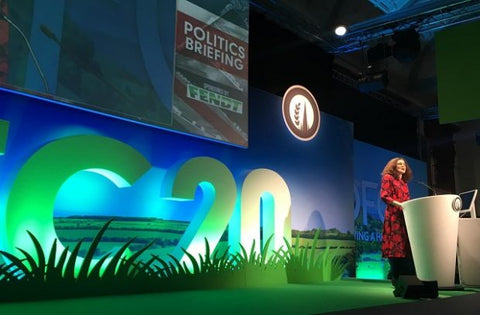The Problem With Chlorinated Chicken
A few weeks ago I went to the Oxford Farming Conference, where I learnt about chlorinated chicken. In the U.S., chicken is washed with chemicals before sale. Why? Because there are so many micro-organisms - like listeria and salmonella - on the carcasses*. And why is that? Because the conditions many chickens are kept under Stateside are - frankly - disgusting.
U.S. food standards are - generally - below the EU's. To take meat; It's not just chicken, but beef injected with hormones and pigs kept in giant and deeply unpleasant factory farming units. Chlorinated chicken is just symptomatic of broader problems; rules on pesticides used in fruit and veg production are wildly different too, for example. And not in a good way. I have many farming friends, and they're affronted by some of the practices we've been protected from. The same was clearly true of the folk at the conference.

Photo: DEFRA
Which is why Theresa Villiers, our current DEFRA minister, had her work - ahem! - let's say "cut out " persuading the delegates that EU standards weren't just going to be maintained post Brexit, but enhanced.
There is a real potential dividend to be won from leaving the Common Agricultural Policy. The recent second reading of the Agriculture Bill reminded us what this might be. We're going to start paying farmers for public goods - not just for the acres they own. That's things like meadow and trees, hedgerows, ponds, public access - DEFRA have identified over 800 potential actions to be included in ELMS (that's not "European Le Mans Series" - it's Environmental Land Management Scheme). Who is going to work this out and how they're going to be funded is another story, but the intention is clear and to be applauded.
All this falls apart, however, if the farmers can't produce food. Everyone agrees that this is what they should do. They can produce less food, to different standards. They can produce different kinds of food. They can produce food using different methods. They're an adaptable lot and they're not just land managers; we need them to produce food.
And this, I'm afraid, is now in doubt.
Despite repeated government assurances, the principle that imported food should be subjected to the same high standards our own food has to meet to has not been enshrined in legislation. The public is overwhelmingly in favour of this happening, but it has been conspicuously absent. It's not in the Agriculture Bill. It's not in the Environment Bill, where it also might have been.
Why is this so important? Clearly, there's a cost associated with meeting the standards we want. If our guys are meeting them but competing with people who aren't, they will get wiped out. I know some consumers will buy the higher welfare, tastier or (more) organic option, but history suggests that price is a major determinant in food choice. If our small farmers are wiped out and the larger ones then get embroiled in a price war, there will be a race to the bottom. Our food security will be further compromised. And farmers are the custodians of something pushing 70% of the UK. The consumer and the environment will be the losers.
Agriculture is one of the red lines for the Trump administration - for obvious reasons. U.S. farmers are overwhelmingly pro-Trump, and agriculture will be at the heart of the trade deal both the UK and US are desperate to sign. There's a good chance UK farming is about to be thrown under a bus, and with it all that good stuff in the Agriculture Bill.
I'm not just worried because equivalence in imported food standards hasn't shown up in any post Brexit legislation. There are also early signs are that the government wants to abandon the "precautionary principle" which underpins EU legislation.
This is one of those rare issues where environmentalists are at one with the farming lobby. We all have much to lose if this goes wrong.
*and it doesn't seem to deal with either, incidentally.
